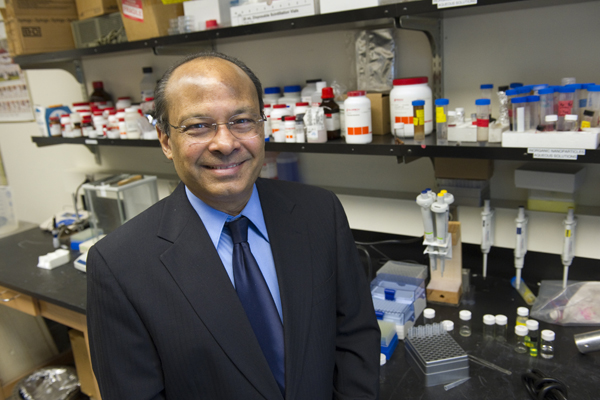An innovation ecosystem drives future for nanomedicine

From targeted drug delivery mechanisms to supersensitive imaging techniques, nanotechnology holds many promises for medicine. But advances taking place in the research lab will help few patients without successful translation into clinical and commercial environments, said Srinivas Sridhar, Distinguished Professor of Physics and director the Nanomedicine IGERT Center, an Integrative Graduate Education and Research Traineeship jointly funded by the National Science Foundation and the National Cancer Institute.
Since its inception in 2005, the center has sought to establish educational and research leadership in the fields of nanomedicine and nanobiology, according to Sridhar, but only recently has it begun to expand into the final frontier: translation. National funding agencies have sounded the call for keeping the research eye on commercialization, he said, but being successful, he explained, “requires an innovation ecosystem. It’s not just scientists and engineers; you’ve got to have many others, like regulators, CEOs, entrepreneurs, government officials, and venture capitalists.”
As part of a new and ongoing effort to establish a knowledge resource for nanomedicine translation, the Nanomedicine IGERT Center introduced a new course, Nanotechnology and Nanomedicine Commercialization: From Concept to Market. The course is taught by Mostafa Analoui, head of healthcare and life sciences at Livingston Securities and an established financier and entrepreneur. In parallel, Sridhar and Analoui organized a first-of-its-kind monthly seminar series this spring, bringing in world-leading experts from a variety of positions along the nanomedicine translation chain. In its first iteration, the seminar welcomed CEOs, directors, and government leaders from IBM, the National Cancer Institute, and Oxford Biosciences.
One speaker, Piotr Grodzinski, the founding director of NCI’s Alliance for Nanotechnology in cancer, praised Northeastern’s established leadership in nanotechnology, from Sridhar’s expertise in characterization to Vladimir Torchilin’s expertise in drug delivery and Ahmed Busnaina’s in nanomanufacturing. The IGERT center adds the educational component, focusing on training the next generation of nanomedicine experts. “In this different economy we’re in now, students need more hands-on experience,” Grodzinski said. “So it’s a clever model Sri has created, which increases students’ chances of getting a job.”
Combined with field-training, the new focus on translation and commercialization promises to educate students to be well-rounded in not only the sciences, but also in business and innovation.
The seminar series is open to the public and has been well-received by students, leaders, and community members alike. Sridhar hopes this will only be the first in a long line of new developments establishing the “innovation ecosystem” he believes is so critical to successfully translate research into feasible patient treatments.